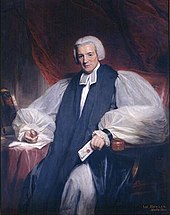William Howley
William Howley (born February 12, 1766 in Ropley , † February 11, 1848 in Lambeth Palace ) was an English clergyman. Bishop of London from 1813 to 1828 and Archbishop of Canterbury from 1828 until his death .
Life
education
William Howley was born in Ropley to the vicar of the same name there. He began his education at Winchester College . There he was awarded a poetry prize in 1782 and 1783.
On September 11, 1783, he enrolled for the study of theology at New College of the University of Oxford . In 1787 he obtained a bachelor's degree , in 1791 his master’s degree and finally received his doctorate as Doctor of Divinity.
Church career
After graduating, Howley entered the church service and was chaplain to the Marquess of Abercorn John Hamilton . This position promoted Howley's career through the influence of his employer. In 1794 he became a fellow at Winchester College and in 1804 a canon at Oxford Cathedral in Oxford. During this time he served as vicar to Bishop Charles Mannors Sutton and in the parish of Andover . In 1809 he was appointed Regius Professor of Divinity at Oxford University. On May 23, 1811, he was also appointed chief minister of the Bradford Peverell Ward .
Howley was installed as Bishop of London in October 1813.
Archbishop of Canterbury
Howley was named Archbishop of Canterbury after the death of Charles Manners Sutton. In the first years of his term of office there were important changes in the law on religious policy. The Test and Corporation Act of 1672 stipulated that only members of the Church of England could hold public office. This law became increasingly discriminatory in the 1820s and repealed in 1828. The complete emancipation of the Catholic Church followed in 1829 in the Catholic Relief Act . Then there was the General Political Reform Act of 1832, which reorganized the constituencies. The bishops in the House of Lords were in opposition to all three laws. Since William Howley was the spokesman for the bishops by virtue of his office, he also spoke out publicly against the laws out of his own conviction. For this, his carriage was attacked in the streets of Canterbury by advocates of the Reform Act. In 1831 Howley presided over the coronation ceremony for King William IV and Queen Adelheid . When the king died on June 20, 1837, Howley, together with Lord Chamberlain , Francis Conyngham , informed the heir to the throne, Princess Victoria of the death of her uncle and her accession to the throne.
Howley was close to the high church movement , which ritually approached Catholicism again , pushed back Protestant influences of the continental Reformation and at the same time maintained the distance that had been achieved to the Roman Catholic Church and the papacy .
Because Howley was interested in architecture , he commissioned various building projects. The most important project was the expansion and renovation work on Lambeth Palace , which was undertaken under the direction of Edward Blore . Lambeth Palace was rebuilt in a neo-Gothic style .
Private life
Howley married Mary Frances Belli on August 29, 1805. The couple had two sons, neither of whom reached adulthood, and three daughters.
William Howley died on February 11, 1848 and was buried in the parish church of Addington in Croydon, London .
Web links
Individual evidence
- ↑ Dr. Marjorie Bloy: The Test and Corporation Acts ( English ) In: A Web of English History . historyhome.co.uk. January 12, 2016. Retrieved October 26, 2016.
- ↑ Dr. Marjorie Bloy: The Repeal of the Test and Corporation Acts: 9 May 1828 ( English ) In: The Victorian Web . victorianweb.org. January 3, 2007. Retrieved October 26, 2016.
- ↑ Dr. Marjorie Bloy: Catholic Emancipation ( English ) In: The Victorian Web . victorianweb.org. August 7, 2002. Retrieved October 26, 2016.
- ^ Assault On His Grace The Archbishop Of Canterbury . In: The Times , Aug 10, 1832, p. 3.
| predecessor | Office | successor |
|---|---|---|
| John Randolph |
Bishop of London 1813–1828 |
Charles Blomfield |
| Charles Manners-Sutton |
Archbishop of Canterbury 1828–1848 |
John Bird Summer |
| personal data | |
|---|---|
| SURNAME | Howley, William |
| BRIEF DESCRIPTION | English clergyman, Bishop of London and Archbishop of Canterbury |
| DATE OF BIRTH | February 12, 1766 |
| PLACE OF BIRTH | Ropley |
| DATE OF DEATH | February 11, 1848 |
| Place of death | Lambeth Palace |
